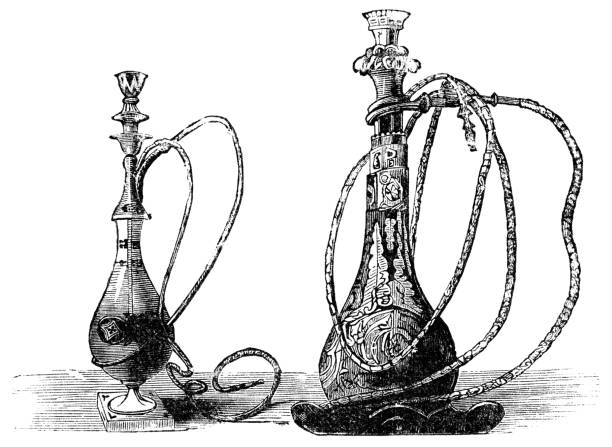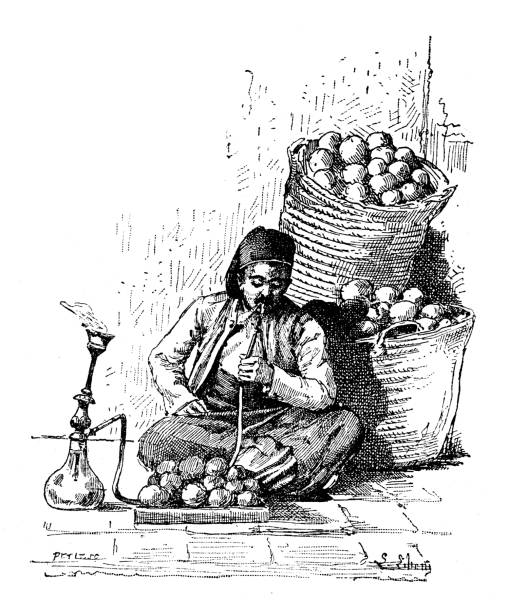Hookah which is also known as waterpipe or narghile, has been a cultural and social staple for many decades. Millions of people from all around the globe enjoy Hookah for its distinctive method of smoking flavored tobacco.
When it comes to the origin and history of Hookah, it is widely surrounded by rich evolutions and culture. According to our ancestors, history is full of surprises and enthusiasm. For instance, from its inception to its modern-day popularity, the journey has gone through numerous changes and time has been nothing short of fascinating. The journey of Hookah and its popularity is continuously growing day by day. This is because it gives unique pleasure to people to refresh their minds and soul.
Without any doubt, we are aware that the hookah has undergone a long journey from its origin in Persia over 500 years ago. Now it has become a global; cultural phenomenon. The overall rise and evolution of hookah reflect broader cultural shifts including from its aristocratic associations in the Middle East to its modern-day role.
These days, people prefer it for social gatherings and social activities across the world and to create memories together.
In this write-up, we will explore everything related to Hookah: its origin, its history, significance and more. Let’s stick to this article to discover the time journey of Hookah to gain valuable information.
Who Invented Hookah?
The development of the hookah cannot be solely credited to one individual. However, the innovation of the waterpipe, as we recognize it today, is typically attributed to a Persian physician named ‘Abd al-Hassan al-Shirazi’ in the 16th century. Al-Shirazi who was a notable scholar and medical practitioner within the Safavid Empire is believed to have adapted the conventional pipe-smoking device of that era by introducing a system for water filtration. This groundbreaking invention significantly cooled and purified the smoke, rendering it smoother and more enjoyable.
Although al-Shirazi is frequently hailed as the progenitor of contemporary hookah, it is crucial to acknowledge that the idea of smoking through a water-based filtration mechanism has origins in ancient societies. Therefore, while al-Shirazi may have enhanced the design of the hookah, the fundamental concept of water pipes has been employed for centuries before his contributions.
When Was Hookah Invented?
The exact date of the invention of hookah is quite difficult to mention. However, it is generally agreed upon that the modern form of hookah mainly came in the 16th century. When it comes to the invention of the, more specifically it is often attributed to the time of the Safavid Dynasty in Persia. It is believed that Safavid ruled from 1501 to 1736 and it was that period when he gave the perfect design, process, and name of the waterpipe. From then, hookah gained immersive popularity all around the world. Earlier it was widely used by the Persian elites but later widespread to entire countries.
According to the sources, it was claimed that hookah was invented in the 16th century. If we talk about the tradition of smoking through water pipes, it has a long history and was invented even 500 years ago. Usually, the Mughals in India and Ottomans in Turkey were known to have used several different forms of water pipes. However, it was the Persians who are credited with giving perfect design, shape and process that people know.
Intriguingly, the practice of smoking tobacco in itself was brought to the Old World as a consequence of the Columbian Exchange during the late 15th century—this occurred around the period of the Americas’ discovery. Before tobacco became widely popular, however, water pipes were employed to smoke various other substances, such as herbs and medicinal plants; although these practices might seem archaic, they laid the groundwork for what would follow.
Where Is Hookah From?
Hookah, as it is understood in contemporary contexts, traces its origins to **Persia** (modern-day Iran). The practice of utilizing water pipes for the purpose of smoking can be traced back to the 16th century, particularly in regions such as the Middle East and Central Asia. It was in Persia, during the Safavid Empire, that the waterpipe underwent a significant transformation into its current iteration; subsequently, it disseminated throughout adjacent territories, including the Ottoman Empire, India, and North Africa.
The proliferation of hookah within the Islamic world was largely enabled by the Ottoman Empire, which played a crucial role in popularising its use in various courts and communal areas. By the 17th century, hookah emerged as a symbol of social prestige; it was often linked with royal courts and gatherings that included intellectuals, poets and philosophers.
However, its significance transcended mere ornamentation, as it also fostered social interaction and cultural exchange among diverse groups.

The Modern Hookah: Globalisation and Popularity
In the late 20th century and 21st centuries, the hookah found its way in Europe and the United States. It was fueled by the increased globalization and immigration from the Middle East. If we talk about the Western countries, the evolution of hookah was often enjoyed in social gatherings like hookah bars, and lounges. These are the social gathering spaces where people from different places come and explore, unite with new people and smoke flavored tobacco, typically a mixed flavour of fruits and sweeteners.
Nowadays, people are more addicted to modern hookah that comes with unique flavors and tastes. It has transformed and has added the introduction of tobacco sold in a variety of fruit, mint, and spices-based flavors. This innovative approach and transformation has made waterpipe smoking more pleasurable. People among younger generations looking for alternative options prefer traditional smoking.
With the rise of social media and the digital world, hookah has become a symbol of socialization and relaxation. Furthermore, it is closely associated with certain practices, rituals, cultures, and artistic performance as well.
Conclusion: A 500-Year Legacy
The hookah has undergone a long journey from its origins in Persia over 500 years ago to becoming a global cultural phenomenon today. Its evolution reflects broader cultural shifts, from its aristocratic associations in the Middle East to its modern-day role as a social activity across the world. While the act of smoking hookah has undoubtedly changed in terms of its social significance and the materials used, it remains a timeless tradition that connects people across generations and borders.
However, some health concerns are interlinked with the use of hookah. Still, the rich culture of the hookah ensures to secure its top position in both past and future smoking customs. It doesn’t matter if it is an ancient ritual or a modern social approach, the hookah still continues to occupy a unique position in the hearts and minds of people.








